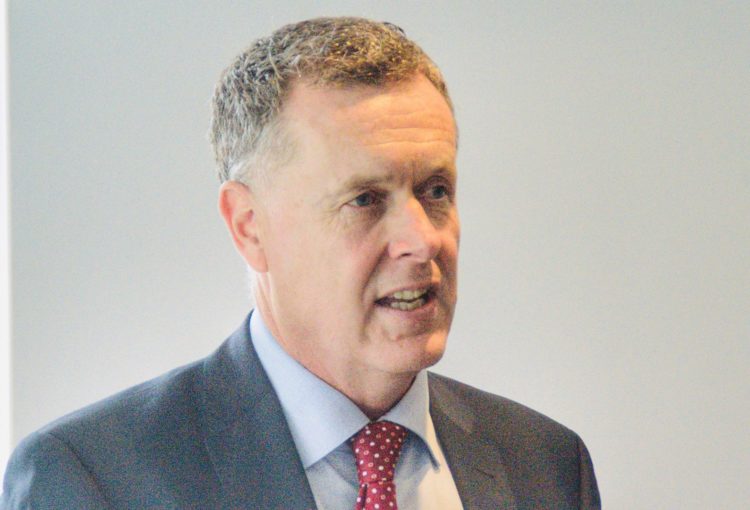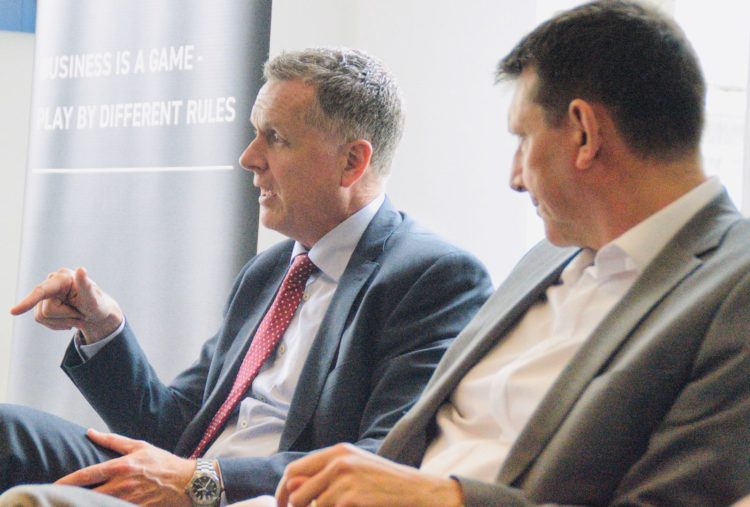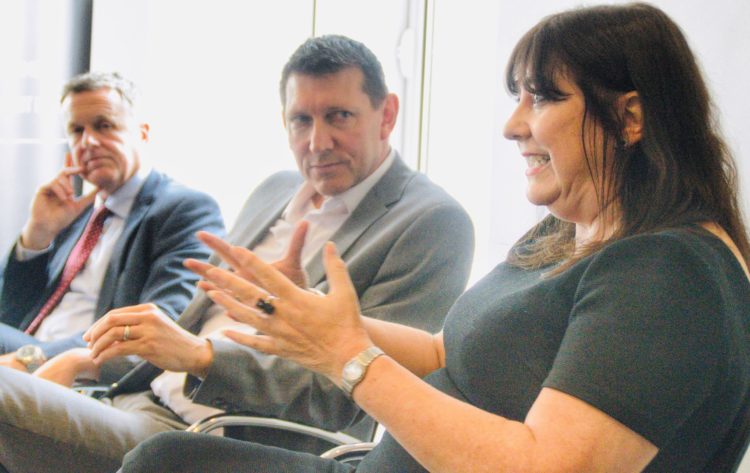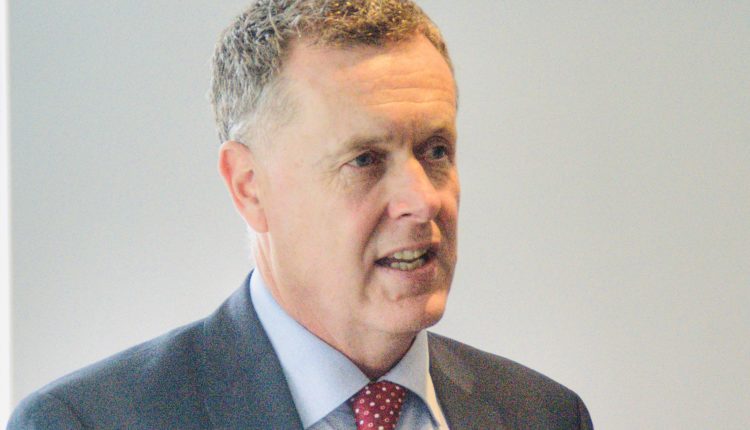- Council CEO Tony Reeves also predicts up to 1.5m sq ft of new office space will be built in the city
- In Downtown in Business discussion with Manchester counterpart Joanne Roney, Mr Reeves said both cities will collaborate more closely
- Ms Roney urges private sector to speak up in support of the £39bn Northern Powerhouse Rail project
- Economic growth must benefit all communities across the region, both say

Liverpool City Council chief executive Tony Reeves says he is confident Liverpool’s £200m Pall Mall commercial development will be fully funded.
And, addressing an audience of business leaders in the city centre, Mr Reeves predicted up to 1.5m sq ft of new office space would be created in the city centre over the next five to 10 years.
That would represent a huge shot in the arm for Liverpool’s commercial district which has seen the pipeline of grade A office space, seen as essential to attract outside blue-chip occupiers to the city.
With the backing of the city council, Kier Property and CTP are aiming to submit an planning application by the end of the month following a public consultation. The scheme will see 400,000 sq ft of office space, a hotel, leisure space and public realm.
Although remedial works have started on the site there is still a question mark over funding for the project. Liverpool’s low headline rents have proved a recent deterrent to investors looking for decent returns.
Rising rents
However, speaking at an event at the offices of Deloitte, organised by business lobby group Downtown In Business, Mr Reeves said he believed discussions with potential investors for the scheme would bear fruit.
In response to a question from LBN, Mr Reeves told those assembled: “I cannot say too much at the moment but I am confident all three phases of Pall Mall will be fully funded and will go ahead.
“We are now seeing demand for office space in Liverpool outstrip supply and there are signs that office rents are moving upwards and so I think the investors will come. I think we will see the creation of between 1m and 1.5m sq ft of office space in Liverpool over the next five to 10 years.”
Inclusive growth
Mr Reeves was taking part in a discussion with his Manchester City Council counterpart, Joanne Roney, chaired by Downtown chief executive Frank McKenna.
They spoke about the strategic value of co-operation between the two great North West cities and also about how economic growth for its own sake wasn’t enough – there had to be a concerted effort to ensure all communities benefited.
“In Paddington Village in the Knowledge Quarter a new office development, the Spine, is already 65% let before it is built and it is the first speculative office development in Liverpool for 10 years,” said Mr Reeves, talking about the city’s ongoing economic renaissance.
“However, our productivity per head of population is one of the lowest of the core cities. It is not good enough to achieve economic growth – we have to connect Liverpool people into the opportunities that this creates.
“Key to that is sorting out education. Despite some great teachers in out schools the skill levels among our people are not where they need to be. Many people in the workplace now are going to be less competitive in the years to come if they don’t have the right skills.”
Prosperity gap
Ms Roney agreed saying that although Manchester had enjoyed significant growth over the past few years there was still a gap between the prosperity of the city centre and the outlying area of the city and the wider Greater Manchester sub-region.
She explained: “We want the city to grow but we want it to grow for the benefit of all of our communities. There are issues we need to address and they include skills and wages. The average wage across Manchester is still £10 less than it is in the city centre.
“We now that 25% of all future jobs generated Greater Manchester will come to the city of Manchester. It is the urban hub. But what Greater Manchester has done is build the tram network that connects the outer areas.”
She added that the public sector Manchester had been unashamed at intervening in the economy and that this strategy had paid dividends with strong demand for office space in the city centre. She said: “Our advice would be to intervene, stick with it and be bold and ambitious.”

High-speed rail
Frank McKenna asked for their views on HS2 and whether they feared a new incoming Conservative Prime Minister would pull the plug on both it and high-speed rail across the North.
Mr Reeves said he didn’t believe any of the Tory leadership candidates would want to risk going into a general election with a pledge to scrap HS2 and he firmly restated the case for high speed rail.
“The case for high-speed rail is extremely strong,” he said. “A lot of the discussion as been around whether it is more important to connect the North to London or whether we need to connect across the North. The truth is, both are equally important.
“Our rail infrastructure is an absolute disgrace. We must now allow ourselves to be dissuaded on the importance of these projects. They would not be just nice to have – they are must-haves.
“In recent years there has been a lack of regional economic policy and the UK had been dependent on the financial services sector in London but now that is vulnerable due to Brexit. So the voice from the Northern cities must be clear.”
Ms Roney added: “Business needs to be more vocal on Northern Powerhouse Rail. That is £39bn of investment but it would still only bring us up to the level of London and the South East. London is overheating and so investment in the North isn’t just for the North – it makes sense for the whole UK.”

Working together
Both spoke about the benefits of collaboration between Liverpool and Manchester where there was common interest and how it was important the hinterlands of both cities were not left behind. While people in the cities had voted overwhelmingly remain, the reverse had been true in smaller towns across the region.
“Our city regions are working together through the combined authorities more than they have ever done and we want to see growth benefit all of our communities,” said Ms Roney.
Mr Reeves added: “There will be times when we compete with Manchester but it is also in the interest of both cities, and the UK, for us to collaborate and work together. Brexit will bring challenges but it also offers opportunities for the whole North West.
“We are westward-facing and we can play a very big role in how we reposition Britain over the coming years.”

